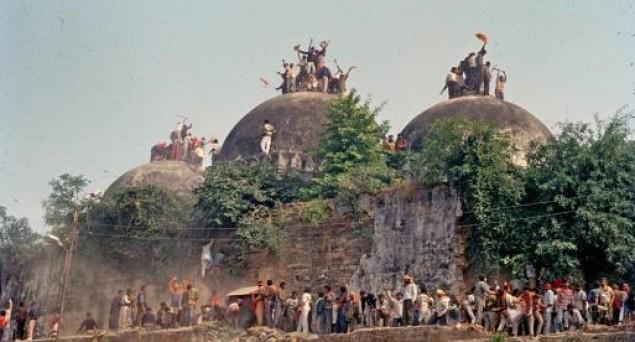Mumtaz Alam | India Tomorrow
New Delhi, March 8— The Supreme Court of India on Friday sent the decades-old Babri Masjid-Ram Janmabhoomi title suit for mediation. The court also appointed a three-member panel for the mediation.
The panel will be headed by retired judge of Supreme Court Justice Fakkir Mohamed Ibrahim Kalifullh. The other two members are Sri Sri Ravi Shankar from Art of Living and Senior Advocate Sriram Panchu. The panel will have liberty to solicit more mediators or seek legal assistance.
The Supreme Court has asked the panel to submit its interim report in four weeks.
The mediation proceedings will be held in Faizabad, and the Supreme Court has directed the Uttar Pradesh government to provide suitable facilities.
The apex court has also directed that the mediation proceedings will be held in-camera and its details shall remain confidential. The top court has barred all media from reporting on the proceedings.
On Wednesday (March 6), the apex court had reserved its order on the possibility of mediation in the decades-old title suit of the Babri Masjid-Ram Janmabhoomi case after hearing arguments from both Hindu and Muslim sides in favour and against its suggestion for mediation. However, it had asked all the concerned parties to give names for the panel of mediators to the court on Wednesday itself so that it can pass order shortly.
SC Offered Mediation Option on Feb 26:
On Feb 26, the five-judge constitutional bench, comprising Chief Justice Ranjan Gogoi, Justice S.A. Bobde, Justice D.Y. Chandrachud, Justice Ashok Bhushan and Justice S. Abdul Nazeer, had suggested mediation on the issue in the course of hearing of a batch of petitions challenging the 2010 Allahabad High Court verdict trifurcating the disputed site in Ayodhya in three parts, giving one each to Nirmohi Akhada, Ram Lalla and the original Muslim litigant.
On the same day, while deferring the hearing in the title suit for six weeks following dispute on translation of related documents, the top court had said that it might order mediation for the amicable resolution of the Ayodhya title issue even though both parties had differed on it. While Hindu parties had summarily rejected mediation, Muslim parties had agreed to it with condition that hearing in the title suit will continue simultaneously. They had also told the top court that previous attempts for mediation in the case have failed.
What Happened in March 6 Hearing?
On March 6 also, before the apex court reserved its order on possibility of mediation, the two parties had expressed reiterated their stand as they did on Feb 26.
Hindu groups opposing mediation had said: “Issue is religious and sentimental. Not a mere property dispute.” Senior advocate C S Vaidyanathan appearing for Ram Lalla said that the faith that the site was the birthplace of Lord Ram was non-negotiable. “We are ready to crowd fund the construction of mosque elsewhere,” he submitted and added that in a case like this, faith and belief can’t be negotiable.
On this, Justice Bobde said that the outcome of mediation does not concern the court when it sends a case for mediation. “We understand the gravity of the case and its impact on body politic,” Justice Bobde said. “You are looking at the outcome even before mediation is attempted. This is also about heart and mind and healing of relations,” he said and remarked that the past cannot be undone. “We have no control over what happened in past. We can’t undo the past but we can only undo what exists before us,” Justice Bobde said.
Muslim groups, on the other hand, expressed willingness for mediation. Senior Adv. Rajeev Dhawan appearing for Sunni Waqf Board submitted that consent of all parties is not needed for the court to refer a case to mediation. He argued for framing of terms for mediation.
Babri Masjid — From installation of Hindu idols inside it to its Demolition
Some Hindu idols were installed inside the 16th century Babri Masjid in Ayodhya in 1949. The title suit has since been in court. The mosque was razed to the ground by a Hindutva mob on December 6, 1992. Through the Acquisition of Certain Area at Ayodhya Act, 1993, the central government had acquired 67 acres of land in Ayodhya, including the plot of 2.7 acres where the mosque once stood. In 2003, the Supreme Court had ordered that the status quo be maintained with regard to the acquired 67 acre of land around the disputed site.
In 2010, the Allahabad High Court had passed a verdict on the title suit of Babri Masjid-Ram Janmabhoomi and ordered trifurcation of the land equally among three parties. However, all concerned parties challenged the verdict in the Supreme Court where it has since been pending.
On the other hand, the cases related to the demolition of the mosque are still pending in lower courts. Several top BJP leaders, including LK Advani, Murli Manohar Joshi, Uma Bharti and others are accused.





